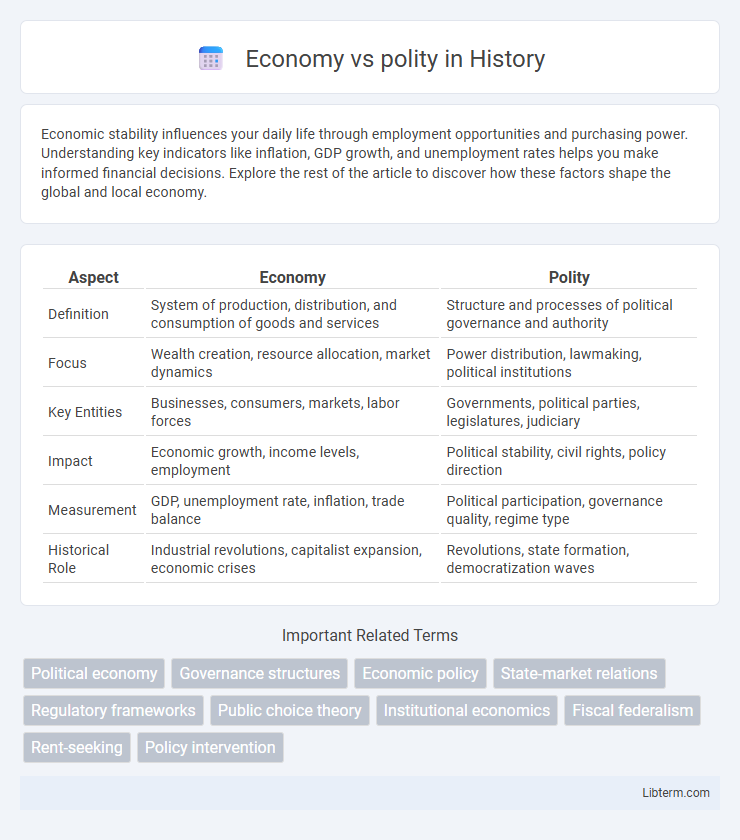Economic stability influences your daily life through employment opportunities and purchasing power. Understanding key indicators like inflation, GDP growth, and unemployment rates helps you make informed financial decisions. Explore the rest of the article to discover how these factors shape the global and local economy.
Table of Comparison
| Aspect | Economy | Polity |
|---|---|---|
| Definition | System of production, distribution, and consumption of goods and services | Structure and processes of political governance and authority |
| Focus | Wealth creation, resource allocation, market dynamics | Power distribution, lawmaking, political institutions |
| Key Entities | Businesses, consumers, markets, labor forces | Governments, political parties, legislatures, judiciary |
| Impact | Economic growth, income levels, employment | Political stability, civil rights, policy direction |
| Measurement | GDP, unemployment rate, inflation, trade balance | Political participation, governance quality, regime type |
| Historical Role | Industrial revolutions, capitalist expansion, economic crises | Revolutions, state formation, democratization waves |
Understanding Economy and Polity: Key Definitions
Economy refers to the system of production, distribution, and consumption of goods and services within a society, influencing resource allocation and wealth generation. Polity encompasses the structure and processes of governance, including institutions, laws, and power dynamics that shape political authority and public policy. Understanding the interaction between economy and polity is crucial for analyzing how economic policies and political decisions impact societal development and stability.
Historical Interactions Between Economy and Polity
Economic systems have historically shaped political structures, as seen in feudal Europe's manorial economy influencing monarchic authority. The Industrial Revolution transformed economies, prompting democratic reforms and nation-state consolidation during the 19th century. Colonialism exemplifies the interplay where economic exploitation underpinned imperial rule, affecting both economic patterns and political governance globally.
Economic Systems and Political Structures: A Comparative Overview
Economic systems such as capitalism, socialism, and mixed economies define how resources are allocated and wealth is distributed, directly influencing political structures like democracies, autocracies, and oligarchies. Capitalist economies emphasize private ownership and market-driven growth, often correlating with liberal democracies that promote individual freedoms and political pluralism. Socialist economic models prioritize state control and equitable distribution, frequently aligning with centralized or authoritarian political regimes that regulate economic and social policies.
The Role of Governance in Economic Development
Governance plays a critical role in economic development by establishing the legal and institutional frameworks that promote market efficiency, property rights, and investment security. Effective governance minimizes corruption, enhances transparency, and ensures political stability, which attracts domestic and foreign investments essential for economic growth. Strong institutions and inclusive policies foster innovation, improve resource allocation, and support sustainable development across sectors.
Policy Making: Economic Interests vs Political Agendas
Policy making often involves balancing economic interests with political agendas, where economic priorities such as growth, employment, and fiscal stability may conflict with political goals like social equity, electoral support, or ideological commitments. Economic policies are designed to optimize resource allocation and market efficiency, while political agendas might prioritize voter satisfaction or power consolidation, leading to trade-offs in policy outcomes. Effective governance requires integrating these divergent objectives to ensure sustainable development and maintain public trust.
Power Dynamics: Who Shapes Who—Economy or Polity?
Power dynamics between economy and polity reveal a complex interplay where economic forces often influence political decisions through lobbying, campaign financing, and control over resources, shaping policy agendas to favor market interests. Conversely, political institutions regulate economic activities by enforcing laws, taxation, and monetary policies that can either stimulate growth or impose constraints on economic actors. The balance of power shifts depending on the strength of regulatory frameworks, the concentration of economic capital, and the degree of political autonomy within a given society.
Economic Crises and Political Responses
Economic crises often trigger significant political responses as governments attempt to stabilize markets and restore public confidence. Policy measures such as stimulus packages, regulatory reforms, and monetary interventions are deployed to mitigate recessionary effects and prevent social unrest. The effectiveness of these political actions critically influences the speed of economic recovery and long-term structural adjustments.
Globalization: Blurring the Lines Between Economy and Polity
Globalization intensifies the interconnectedness of economies and political systems, challenging traditional boundaries between economic policies and state sovereignty. Transnational corporations and international trade agreements increasingly influence national governance, embedding economic interests within political decision-making frameworks. This fusion reshapes global power dynamics, as economic actors gain political clout, complicating regulation and accountability on both domestic and international stages.
Contemporary Case Studies: Economy-Polity Interplay
Contemporary case studies reveal how the interplay between economy and polity shapes national development trajectories, exemplified by China's state-led economic model intertwining political control with market reforms. In contrast, the United States highlights a dynamic where political institutions influence economic policy through democratic processes, affecting fiscal regulations and trade policies. Emerging economies like India demonstrate the complexities of balancing economic liberalization with political decentralization, reflecting diverse governance impacts on growth and social equity.
Future Trends: Toward Economic-Political Synergy
Economic-political synergy is emerging as future trends highlight the integration of governance and market dynamics to drive sustainable growth and social stability. Advancements in digital technologies and data-driven policymaking enable more responsive economic strategies aligned with political goals such as equity and environmental resilience. This convergence fosters innovation ecosystems where economic development supports inclusive political participation and robust institutional frameworks.
Economy Infographic

 libterm.com
libterm.com